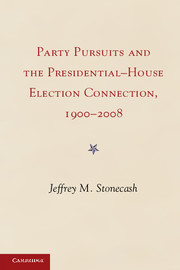Book contents
- Frontmatter
- Contents
- Preface
- Part I Election Patterns and INTERPRETIVE Frameworks
- Part II Explaining a Changing Relationship
- 5 The Democratic Pursuit of the North
- 6 Expanding the Democratic Base
- 7 Republican and Democratic Pursuits of New Constituencies
- 8 The Consequences of Changing Electoral Bases
- 9 Regional Patterns of Change
- 10 Realignment and Converging Results
- 11 Party Pursuits and American Democracy
- Appendix I Presidential–House Elections by House Districts
- Appendix II The Presidential–House Relationship and Uncontested Races
- Appendix III Alternative Explanations of Change
- Bibliography
- Index
- References
11 - Party Pursuits and American Democracy
Published online by Cambridge University Press: 05 January 2013
- Frontmatter
- Contents
- Preface
- Part I Election Patterns and INTERPRETIVE Frameworks
- Part II Explaining a Changing Relationship
- 5 The Democratic Pursuit of the North
- 6 Expanding the Democratic Base
- 7 Republican and Democratic Pursuits of New Constituencies
- 8 The Consequences of Changing Electoral Bases
- 9 Regional Patterns of Change
- 10 Realignment and Converging Results
- 11 Party Pursuits and American Democracy
- Appendix I Presidential–House Elections by House Districts
- Appendix II The Presidential–House Relationship and Uncontested Races
- Appendix III Alternative Explanations of Change
- Bibliography
- Index
- References
Summary
Over the last several decades an interpretation of American elections has dominated that suggests they do not result in a coherent expression of the differing views of voters in both presidential and House elections. To briefly repeat matters reviewed earlier, a series of changes were seen as altering elections. Voters were less attached to parties. House candidates were presumed to be able to present themselves separately from their party, allowing them to boost their vote percentages and buffer their vote swings from presidential fluctuations. The result of greater incumbent autonomy from partisan swings was that voters could reject the policies of one party, but that swing may well not produce changes in who holds seats and which party controls government. There would be less likelihood of unified control of government, resulting in more stalemates and less responsiveness to shifts in public opinion.
These conclusions are all derived from the candidate-centered interpretation of American elections that emerged in the 1970s. That framework has become an assertion without any specific predictions that might allow us to refute it. Without any specific expectations to compare to actual events it becomes asserted again and again, and there is little consideration of alternative interpretations.
- Type
- Chapter
- Information
- Publisher: Cambridge University PressPrint publication year: 2012



